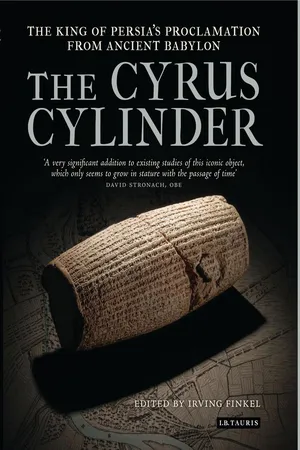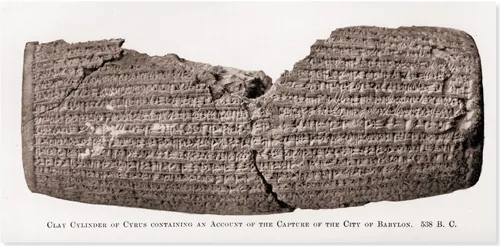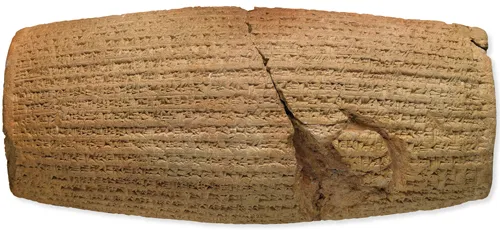
- 160 pages
- English
- ePUB (mobile friendly)
- Available on iOS & Android
About This Book
Some historical artfacts are destined forever to alter how the ancient world is perceived. The unerathing in today's Iraq (in 1879) of a clay cylinder-shaped decree from Cyrus the Great, founder of the Achaemenid dynasty of Persia, stands in the same traditin of game changing discoveries from antiquity as Hammurabi's famous law code or the intact tom of the boy-king Tutankhamun. For the Cyrus Cylinder contains in microcosm the whole history of its period. Inscribed with an account of the conquest of Babylon in 539 BC by the Persian king, it records an event which launched one of the greatest imperial adventures in history. It describes Cyrus' capture and deposition of Nabondius, last native Babylonian ruler (represented by the Cylinder text as an oppressor of his own people), and proclaims the Persian, aided by the god Marduk, as a liberator. His annexation of Babylon was to become the platform upon which the Achaemenid military machine built its later vast imperium. But the Cylinder is more than an ancient exercise in propaganda.
It has been celebrated as the world's first declaration of human rights, and an international symbl of religious tolerance, setting out the decree from which Cyrus freed the Jews in Babylon: an event recorded by Isaiah. Few other objects from antiquity are invested with so many hopes for the future. This important volume is the first to discuss the Cylinder and its remarkable history. Written by internationally respected authorities from the British Museum, it offers a fresh consideration of its subject in the light of new discoveries. Included here is a complete new translation of the Cylinder inscription using recently identified but previously unpublished sources. Archive materials have allowed a fresh investigation of the circumstances of the original nineteenth-century find by Hormuzd Rassam, and a reappraisal of the mysterious 'Chinese bone' forgeries. The book also discusses the extraordinary and evolving history of Cyrus' timeless message: a message that continues powerfully to resonate.
Frequently asked questions
Information
1
The Cyrus Cylinder: the Babylonian perspective
IRVING FINKEL


| Marduk | | The city god of Babylon and the patron of the Neo-Babylonian kings of Babylon |
| Belshazzar | | The firstborn son of Nabonidus, the last native king of Babylon (556–539 BC), who acted as regent for his father during his absence in Teima in Arabia |
| Esagil | | The great temple dedicated to Marduk in Babylon, south of the ziggurat tower complex Etemenanki |
| Enlil | | The second most powerful of the ancient gods of Mesopotamia, whose place was usurped by Marduk |
| Shuanna | | A name for the city of Babylon, here standing for the whole city but in fact that name of the southernmost quarter |
| Sumer and Akkad | | The old names for southern Mesopotamia, later Babylonia |
| Tintir | | The old Sumerian name for the city of Babylon |
| Anshan | | Ancient Elamite city, modern Tal-e Malyan, northwest of Shiraz in southern Iran |
| Guti | | The name for the inhabitants of the area between the Zagros Mountains and the River Tigris, referring specifically to Iranians, including the Medes and their companions |
| Nabu | | The god of writing, son of Marduk and his wife Zarpanitu |
| Amurru | | The west land |
| Ashur | | One of the old Assyrian capital cities in the north of Iraq, on the upper reaches of the River Tigris |
| Susa | | Elamite capital city in southwest Iran |
| Eshnunna | | Central Babylonian city on the Diyala river in Iraq |
| Zamban | | A city in the northeast |
| Meturnu | | A city located roughly between Zamban and Eshnunna |
| Der | | An ancient city located east of the Tigris river on the border between Sumer and Elam |
| Tigris | | The river that with the Euphrates defined ancient Mesopotamia, the ‘land between the rivers’ |
| Imgur-Enlil | | The famous Inner Wall of the city of Babylon |
| Ashurbanipal | | The last great king of Assyria (685–627 BC), warrior-librarian, who undertook restoration work in Babylon and left an account of it buried for the future that Cyrus later discovered |
Table of contents
- Author’s biography
- Title Page
- Copyright Page
- Contents
- LIST OF ILLUSTRATIONS
- Preface – JONATHAN TUBB
- Introduction – IRVING FINKEL
- CHAPTER 1: The Cyrus Cylinder: the Babylonian perspective – IRVING FINKEL
- CHAPTER 2: The Cyrus Cylinder: discovery – JONATHAN TAYLOR
- CHAPTER 3: The Cyrus Cylinder: display and replica – ST JOHN SIMPSON
- CHAPTER 4: The Cyrus Cylinder: the creation of an icon and its loan to Tehran – JOHN CURTIS
- CHAPTER 5: The Cyrus Cylinder: a Persian perspective – SHAHROKH RAZMJOU
- Afterword – IRVING FINKEL
- APPENDIX: Transliteration of the Cyrus Cylinder text– IRVING FINKEL
- REFERENCES